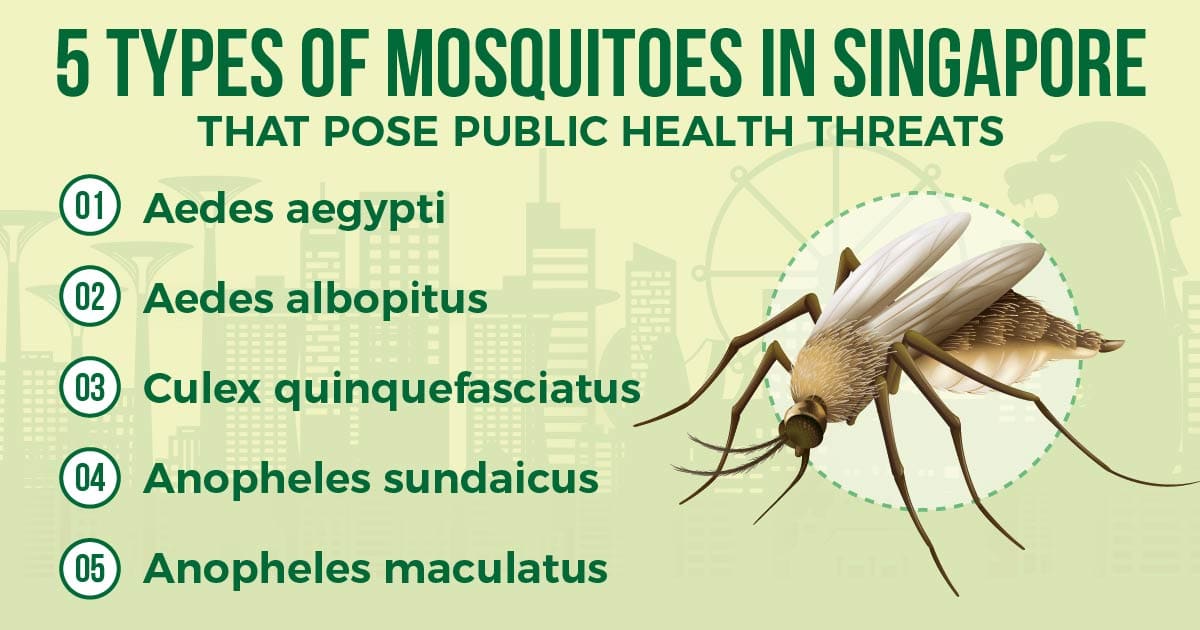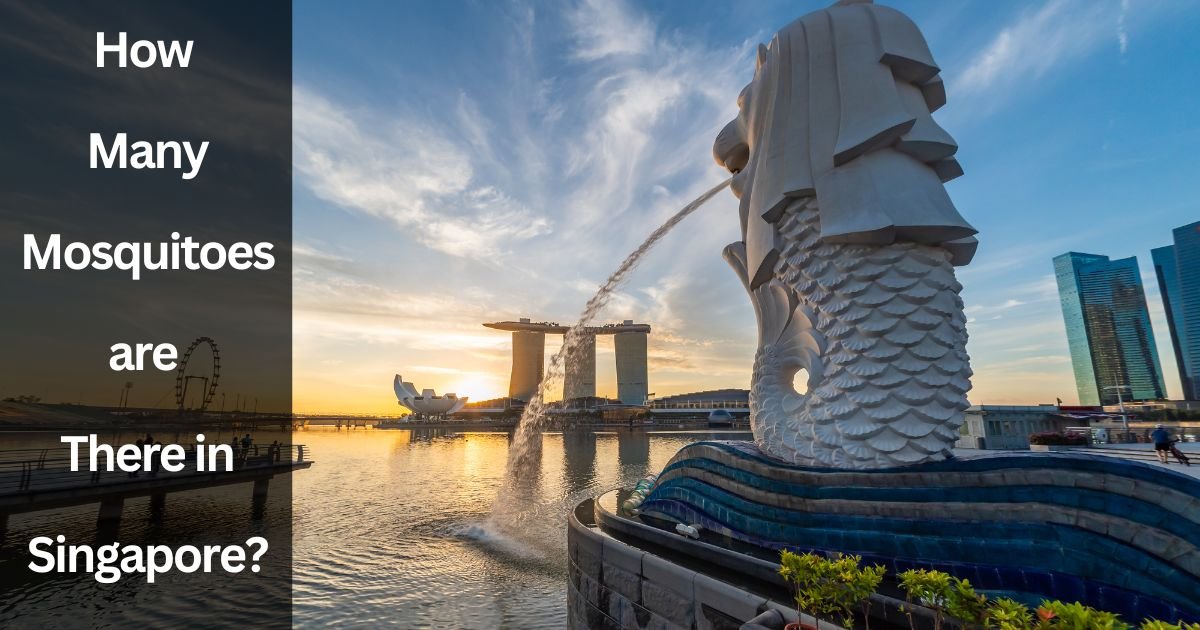There are countless mosquitoes in Singapore due to its tropical climate and ideal breeding conditions. Singapore has a high number of mosquito species, including the Aedes, Anopheles, and Culex mosquitoes, which are common vectors for diseases like dengue fever.
The warm and humid weather in Singapore provides a perfect environment for mosquitoes to thrive and reproduce rapidly, leading to significant populations throughout the country. Efforts to control mosquito populations and prevent diseases are ongoing in Singapore, with initiatives such as the Wolbachia-Aedes mosquito suppression strategy being implemented to combat the spread of mosquito-borne illnesses.

Credit: www.rentokil.com
Introduction To Mosquito Populations In Singapore
Singapore is home to a significant mosquito population, with various species thriving in the tropical climate. The country’s efforts to manage these insects are ongoing, with initiatives such as the Wolbachia-Aedes mosquito suppression strategy aimed at controlling their numbers and preventing diseases like dengue.
The Significance Of Studying Mosquitoes
Studying mosquitoes is crucial for understanding diseases they transmit, such as dengue and malaria.
Brief Overview Of Mosquito Diversity In Singapore
Singapore hosts various mosquito species, including Anopheles, Aedes, and Culex mosquitoes.
Estimating Mosquito Numbers
Estimating mosquito numbers in Singapore is crucial for implementing effective control measures and understanding the risk of mosquito-borne diseases. Accurate estimation of mosquito populations involves various methods and encounters several challenges.
Methods For Counting Mosquito Populations
Several methods are used to estimate mosquito populations in Singapore, including trapping and surveillance. Mosquito traps are strategically placed to capture and count mosquitoes, providing valuable data for population estimation. Additionally, larval surveys are conducted to assess the presence of mosquito breeding sites and estimate the potential adult mosquito population.
Challenges In Accurate Estimation
Estimating mosquito numbers in Singapore faces challenges such as the diverse mosquito species present, variations in breeding habitats, and environmental factors affecting mosquito populations. Additionally, the dynamic nature of mosquito populations and their ability to adapt to control measures pose challenges in accurately estimating their numbers.
Main Species Of Mosquitoes In Singapore
When it comes to mosquitoes, Singapore is home to several main species that are known for causing various health concerns. Understanding the characteristics and roles of these species is crucial in implementing effective mosquito control measures.
Characteristics Of Aedes Mosquitoes
The Aedes mosquitoes are characterized by their distinctive black and white stripes on their bodies. These aggressive daytime biters are known carriers of diseases such as dengue fever, Zika virus, and chikungunya.
Role Of Anopheles And Culex Species
The Anopheles species of mosquitoes are primarily responsible for transmitting malaria, while the Culex species are known carriers of diseases such as Japanese encephalitis and West Nile virus.

Credit: www.youtube.com
Factors Influencing Mosquito Populations
Various factors influence mosquito populations in Singapore, including climate, urbanization, and breeding sites. The tropical climate provides an ideal environment for mosquitoes to thrive, resulting in a significant presence in the region. Control measures and public awareness campaigns play a crucial role in managing mosquito populations to prevent diseases like dengue fever.
Factors Influencing Mosquito Populations Mosquitoes are a common sight in Singapore, and their populations can vary significantly depending on several factors. Understanding these factors can help in developing effective measures to control mosquito populations. Here are some of the key factors that influence mosquito populations in Singapore.
Impact Of Singapore’s Climate
Singapore’s tropical climate creates ideal conditions for mosquitoes to thrive. The warm and humid climate provides the perfect environment for mosquitoes to breed and multiply rapidly. Heavy rainfall is also common in Singapore, which creates stagnant pools of water that serve as breeding grounds for mosquitoes.
Urbanization And Its Effects
Rapid urbanization has had a significant impact on mosquito populations in Singapore. The construction of buildings and infrastructure has led to the destruction of natural habitats, which has disrupted the balance of ecosystems. This disruption has led to an increase in mosquito populations, as mosquitoes are able to adapt to urban environments and utilize man-made structures for breeding. In addition to this, urbanization has also led to an increase in the amount of standing water in Singapore. This standing water provides mosquitoes with ideal breeding grounds, leading to an increase in their populations. To combat this, it is crucial to implement effective measures to eliminate standing water and prevent the accumulation of water in urban areas. Overall, understanding the factors that influence mosquito populations is crucial in developing effective strategies for controlling their populations. By addressing these factors, it is possible to reduce the number of mosquitoes in Singapore and minimize the risk of mosquito-borne diseases.
Health Risks Associated With Mosquitoes
Singapore hosts a substantial population of mosquitoes, posing health risks due to diseases they carry. The prevalence of mosquitoes in Singapore necessitates vigilant prevention measures to combat potential health threats.
Health Risks Associated with Mosquitoes Mosquitoes are not just pesky insects that cause itchy bites; they are also carriers of various diseases that can pose serious health risks to humans. In Singapore, the most common mosquito-borne illnesses are dengue fever, Zika virus, and chikungunya. These diseases can cause symptoms ranging from mild fever and rash to severe joint pain and even death. Therefore, it is crucial to take necessary measures to prevent mosquito bites and control their population. Diseases Transmitted by Mosquitoes The Aedes mosquito, which is prevalent in Singapore, is responsible for transmitting dengue fever, Zika virus, and chikungunya. Dengue fever is the most common disease transmitted by mosquitoes in Singapore, with an average of 15,000 cases reported annually. Zika virus, which was first detected in Singapore in 2016, can cause birth defects in newborns if contracted by pregnant women. Chikungunya, although less common, can cause severe joint pain and fever. Public Health Initiatives and Outcomes The Singapore government has implemented various initiatives to control the mosquito population and prevent the spread of mosquito-borne diseases. These initiatives include regular fogging, source reduction, and public education campaigns. The National Environment Agency (NEA) is responsible for monitoring and controlling the mosquito population in Singapore. As a result of these efforts, the number of dengue cases in Singapore has decreased significantly in recent years. However, it is still crucial to remain vigilant and take necessary precautions to prevent mosquito bites and the transmission of diseases. In conclusion, mosquitoes are not just a nuisance; they can pose serious health risks to humans. It is essential to take necessary measures to prevent mosquito bites and control their population. With the help of public health initiatives and personal responsibility, we can reduce the incidence of mosquito-borne diseases in Singapore.
Control Measures And Strategies
Mosquito control in Singapore is a crucial aspect of public health due to the prevalence of mosquito-borne diseases. Various control measures and strategies are implemented to manage the mosquito population and minimize the risk of disease transmission.
Wolbachia-aedes Mosquito Suppression Strategy
The Wolbachia-Aedes mosquito suppression strategy involves the release of male Aedes mosquitoes infected with the Wolbachia bacterium. When these infected males mate with wild female Aedes mosquitoes, the eggs do not hatch, thereby reducing the mosquito population over time. This innovative approach offers a sustainable and environmentally friendly method of mosquito control.
Effectiveness Of Fogging And Other Control Measures
Fogging, larviciding, and source reduction are commonly used control measures in Singapore. Fogging, in particular, is effective in rapidly reducing adult mosquito populations in localized areas. However, these methods may have limitations in controlling the overall mosquito population and require ongoing application to maintain effectiveness. Additionally, community engagement and public education play a crucial role in enhancing the effectiveness of these control measures by promoting proactive mosquito prevention practices.
Research And Developments
Innovations In Mosquito Control
With the relentless efforts to combat the mosquito population in Singapore, there have been remarkable advancements in mosquito control. One such innovation is the release of Wolbachia-infected male mosquitoes, which has shown promising results in suppressing the Aedes aegypti mosquito population in various study sites across the country. This innovative approach holds great potential for reducing the transmission of dengue fever and other mosquito-borne diseases.
Future Directions In Mosquito Management
Looking ahead, the future of mosquito management in Singapore is focused on sustainable and environmentally friendly strategies. Researchers and authorities are exploring the use of genetically modified mosquitoes and novel biocontrol agents to further curb mosquito populations. Additionally, there is a growing emphasis on community engagement and education to promote proactive measures and reduce mosquito breeding grounds.

Credit: killem.com.sg
Community Participation And Awareness
Educational Programs
Community engagement is crucial in tackling mosquito-related issues in Singapore. Educational programs play a vital role in raising awareness about mosquito-borne diseases.
Role Of Community In Mosquito Control
Communities are active participants in mosquito control efforts. By eliminating breeding grounds and practicing preventive measures, each individual contributes to reducing mosquito populations.
Frequently Asked Questions
Are There Lots Of Mosquitoes In Singapore?
Singapore has a high mosquito population due to its tropical climate. Insects thrive there, causing inconveniences and health issues.
What Country Has The Highest Mosquito Population?
Brazil has the highest mosquito population, followed by Indonesia, Australia, and the Philippines.
Are There A Lot Of Insects In Singapore?
Yes, Singapore has a high population of insects due to its tropical climate. Insects play a vital role in the ecosystem but can also cause inconvenience and health issues.
Conclusion
Singapore’s mosquito population is influenced by various factors, including climate and urbanization. Efforts like Wolbachia mosquito release show promising results in controlling mosquito-borne diseases. Understanding mosquito species distribution is crucial for effective prevention strategies in Singapore. Stay informed and take proactive measures against mosquitoes for a healthier environment.
Related posts:

I’m MD Tanvir, and I bring years of expertise gained from working closely with pest control companies to the forefront. My journey in the industry has inspired me to launch Bug Battler, a platform aimed at equipping people with the know-how to combat pests autonomously. Through Bug Battler, I aim to empower individuals with practical insights to tackle pest infestations effectively.

